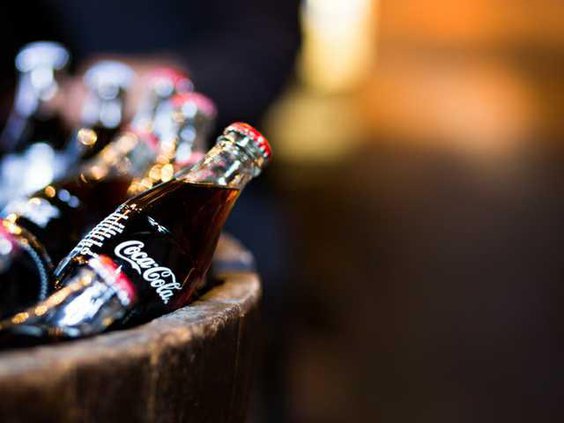A new ad campaign by the famously innovative folks at Coca-Cola argues it's time to forget labeling and start loving.
To promote this new vision of inclusion, Coke has replaced its "Share a Coke" cans with labeless ones all across the Middle East. In fact, consumers won't even find the name of the company on the packaging, just the phrase "labels are for cans, not for people" printed in a white bold font.
The campaign is Coke's way of celebrating Ramadan, a Muslim holiday celebrated during the ninth month of the Muslim year (which this year goes from June 17 to July 17). Typically, Muslims who observe Ramadan abstain from eating or drinking from sunrise to sunset each day during the course of the holiday. Apparently, Coke hopes they'll break their fast with a soda.
Fighting prejudice is an ongoing global battle, which Coca-Cola Middle East is proud to help combat this Ramadan by reminding the public that labels are for cans not for people, Islam El Dessouky, IMC manager for Coca-Cola Middle East, said in a press statement. By urging everyone to remove stereotypes, we hope to spread happiness to the wider community.
As part of the campaign, Coke released a video which claims to document "a unique social experiment that highlights stereotyping in society."
The video, which was uploaded to YouTube on July 4, shows a group of men asking each other questions and becoming acquainted, despite the fact they can't see what the man sitting across from them looks like. They sit at a large table in a dark room, discussing aspects of their personal lives, fears and motivations.
When the lights are turned on, the men are stunned to learn that they had misjudged what their new-found friends look like.
"It's obvious," one of the participants says in the video, "we shouldn't judge people by their looks."
This isn't the first time the Coca-Cola company has used documentary style advertisements to get its message out. In 2014, it released a short documentary chronicling the lives of "everyday heroes" who deserve a special "thank you." The heart-warming video concluded by urging viewers to "share a Coke."
Soda companies are paving the way in innovative "feel good" advertising, which might be due, at least in part, to recent attention paid to the negative health effects of sugary drinks.
To promote this new vision of inclusion, Coke has replaced its "Share a Coke" cans with labeless ones all across the Middle East. In fact, consumers won't even find the name of the company on the packaging, just the phrase "labels are for cans, not for people" printed in a white bold font.
The campaign is Coke's way of celebrating Ramadan, a Muslim holiday celebrated during the ninth month of the Muslim year (which this year goes from June 17 to July 17). Typically, Muslims who observe Ramadan abstain from eating or drinking from sunrise to sunset each day during the course of the holiday. Apparently, Coke hopes they'll break their fast with a soda.
Fighting prejudice is an ongoing global battle, which Coca-Cola Middle East is proud to help combat this Ramadan by reminding the public that labels are for cans not for people, Islam El Dessouky, IMC manager for Coca-Cola Middle East, said in a press statement. By urging everyone to remove stereotypes, we hope to spread happiness to the wider community.
As part of the campaign, Coke released a video which claims to document "a unique social experiment that highlights stereotyping in society."
The video, which was uploaded to YouTube on July 4, shows a group of men asking each other questions and becoming acquainted, despite the fact they can't see what the man sitting across from them looks like. They sit at a large table in a dark room, discussing aspects of their personal lives, fears and motivations.
When the lights are turned on, the men are stunned to learn that they had misjudged what their new-found friends look like.
"It's obvious," one of the participants says in the video, "we shouldn't judge people by their looks."
This isn't the first time the Coca-Cola company has used documentary style advertisements to get its message out. In 2014, it released a short documentary chronicling the lives of "everyday heroes" who deserve a special "thank you." The heart-warming video concluded by urging viewers to "share a Coke."
Soda companies are paving the way in innovative "feel good" advertising, which might be due, at least in part, to recent attention paid to the negative health effects of sugary drinks.





